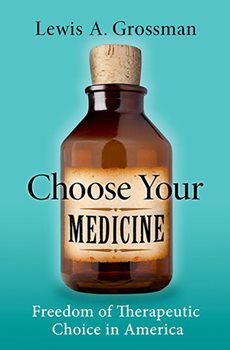Author Spotlight: Lewis Grossman Traces America’s Stance on Medical Freedoms
October 22, 2021
The D.C. Bar counts among its members many authors whose books and stories run the gamut. To celebrate October as National Book Month, the Bar will be featuring some of these attorney–authors who have published works in a variety of genres.
 Lewis A. Grossman, professor of law and affiliate professor of history at American University, offers perspective on the pandemic-related mask and vaccine mandates by tracing the persistent but evolving concept of medical freedom in the United States in his recently released book, Choose Your Medicine: Freedom of Therapeutic Choice in America.
Lewis A. Grossman, professor of law and affiliate professor of history at American University, offers perspective on the pandemic-related mask and vaccine mandates by tracing the persistent but evolving concept of medical freedom in the United States in his recently released book, Choose Your Medicine: Freedom of Therapeutic Choice in America.
Grossman examines popular resistance to medical licensure, Food and Drug Administration limitations on approved drugs and alternative remedies, abortion restrictions, medical marijuana, physician-assisted suicide, and mask and vaccine requirements, illustrating how today’s conflicts arise from a long tradition of American skepticism about the medical orthodoxy.
You approach the question of therapeutic freedom of choice as a historian rather than as an advocate. What does a historian’s approach reveal that an advocate’s wouldn’t?
The entry point for me into this topic was the Abigail Alliance [v. Von Eschenbach] case, which was decided by the D.C. Circuit [in 2007]. An organization argued that people have a substantive due process right to access unapproved drugs if they are terminally ill and have no other options other than those drugs. The D.C. Circuit said that there is no such substantive due process right, and the test they used was from a case called [Washington v.] Glucksberg, which asks . . . whether that right is deeply rooted in the country’s history and traditions.
In Abigail Alliance the authors of the decision and the dissenters each reviewed the history and reached opposite conclusions. The majority said that there is a long history of drug regulation in America, going back to the country’s earliest years, and that there’s never been a fundamental right to choice. The dissenters looked at the same record and reached the opposite conclusion.
I wanted to examine this history, but whereas lawyers tend to look only at cases, statutes, and regulations, I, as a historian, used a much wider lens. I looked at cases, but I also looked at political campaigns, gubernatorial vetoes, debates in legislatures, discussions in hearings, and protests in the streets to get a much deeper sense of what America’s attitude toward this issue has been.
In doing so, I was drawing on a scholarly approach called “popular constitutionalism.” Popular constitutionalism says that the meaning of the country’s constitutional values has been shaped not only by courts, but also by the people in other forums. When I did my research, I concluded that the history of the freedom of therapeutic choice is a fantastic illustration of the way that constitutional attitudes toward an important issue have been shaped in this country by activism in the streets, in the popular press, in legislatures, in agency hearings, in campaigns for referenda and initiatives, and in other forums . . . much more so than in the courts.
 What are some of the disparate groups and individuals that have supported therapeutic choice? Are their positions reconcilable or fundamentally different?
What are some of the disparate groups and individuals that have supported therapeutic choice? Are their positions reconcilable or fundamentally different?
Some examples of the strange partnerships with respect to medical choice include the Abigail Alliance case itself, where the dissenters were Judith Rogers, a liberal Clinton appointee, and Doug Ginsburg, a conservative Reagan appointee. But this reflects a much broader phenomenon.
To me, the first great bipartisan medical freedom movement of the modern era was the battle for the legalization of an alternative cancer drug called Laetrile in the 1970s. Although advocacy for the drug started primarily as a right-wing movement, even an extreme one, by 1977 it was a truly bipartisan movement that joined conservative libertarians with countercultural hippies. Argument from these fringes led to growing support among moderates, to the point that something like 70 percent of Americans thought that this drug, which had never been established to be safe or effective in clinical trials, should be legal.
You can see this odd bedfellow phenomenon continue into modern disputes. For example, with medical marijuana we’ve seen conservative Republican and liberal Democrats joining together, resulting in medical and recreational marijuana legalization successes in both red and blue states. Another example comes from the 1980s, when AIDS activists were seeking faster approval and freer access to drugs prior to FDA approval. They were joined in this effort by Reagan and Bush deregulators. I found this remarkable clip from CNN’s Crossfire in which Pat Buchanan embraced the cause of gay activists.
Conservatives tend to view these issues as a question of the intrusions of big government, often with a conspiratorial angle . . . Their notion is that people trying to restrict medical choice have unholy motives, primarily to monopolize markets and restrict competition. Conservative approaches also often have a religious overlay. Since the earliest years of the country, there has been an almost inextricable connection between freedom of choice and free exercise of religion. In the modern times you’ve tended to see that more from the right.
From the left, ever since the days of Roe, there tends to be a focus on bodily autonomy, above all. But that is joined to a similar distrust in establishment solutions, which doesn’t quite as frequently stray over into the paranoid, but very much exists when it comes to the left.
One thing you often see the left and the right share is a certain embrace of the cult of the natural . . . the idea that if something is a natural product, government has less of a business interfering with people’s right to access it. This is evident in the medical marijuana movement and in dietary supplement regulation.
What barriers are there to finding consensus?
I’m describing very widely shared attitudes, but I don’t mean to suggest that they are universal attitudes. And you can certainly see that when it comes to the COVID-19 pandemic, there is far from a consensus. Despite all of the focus on vaccine deniers and people seeking alternative remedies, you still have a majority of Americans who are getting vaccinated and are following the guidance of the medical establishment.
Therefore, in my book, I’m not arguing that Americans as a whole are so universally committed to therapeutic freedom of choice that it is a deeply rooted notion that should be reflected in judicial creation of a fundamental right. But I am arguing that it is a consistent, constant theme in
America that, given the right issue or circumstances, can lead to a bipartisan joinder of forces that leads to a very real effect on policy and law.
How have your own views of medicine and medical freedom been impacted by your study into the topic?
A lot of people want to know what my own views are on the issue. My first tactic is to take the cowardly way out and say that I’m a historian describing events, rather than a polemicist taking a position, but of course I have views on this. For me, it is very situation-specific and very difficult. There are so many different factors to take into account in a particular medical dispute.
Certainly, when it comes to vaccines, where the issue is not only your own freedom but also the impact it has on others since vaccines relate to communicable disease . . . I must say that I’m very much in favor of vaccines and vaccine mandates.
The tougher question for me is when is it permissible for the government to tell a citizen, often in consultation with his or her doctor, that they are not allowed to make their own risk–benefit assessment and try something, especially when they are in a situation in which they are really out of options. I think, in general, I incline toward a more choice-maximizing position in those cases, but I also acknowledge that even in those situations there are countervailing considerations. One of these is that if there were unfettered access to drugs prior to their approval and companies could sell them for a profit, then nobody would ever have an incentive to do the full clinical trials necessary to determine whether or not those drugs were safe and effective.
In an odd sort of way, that issue presents the tension between individualism and altruism in the same way that vaccine mandates do. I like to think of myself as an altruistic person, and just like I think that people should take the vaccine — not only because it’s in their own self-interest, but also because it’s in the community’s best interest — I’d also like to think that it’s fine to tell Americans that before a drug is approved they might have to participate in a clinical trial in which they may get a placebo instead of the actual drug because as a society we need clinical research to verify that drugs are safe and effective. But when confronted with individual stories of desperate people reaching for their last option, it’s hard to maintain that position.
I hope that by wrestling with the history and stories recounted in my book, people will stop and think hard about their positions relating to these issues and realize there is often a good argument on the other side. In addition, policymakers should understand that when they take positions restricting choice, they are rowing against a very strong current that isn’t always based on superstition or irrational thought or corporate greed, but often based on deeply held authentic principles.
How can people find this and other works by you?
The book is now available from your favorite online or brick-and-mortar bookseller or directly from Oxford University Press. Readers can find out more about me and my other pursuits on my faculty page at the American University Washington College of Law website, and while you’re there, check out all the amazing things happening at WCL under our spectacular new dean, Roger Fairfax!





